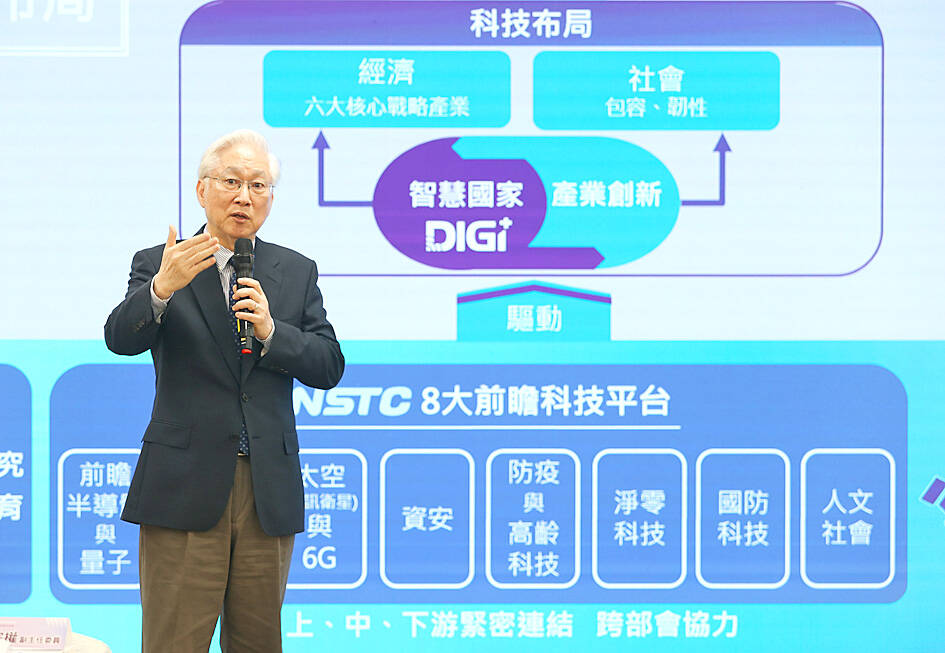Taiwan is to develop its own version of chat generative pretrained transformer (ChatGPT) to prevent an artificial intelligence (AI) system trained to offer biased information from China or authoritarian regimes from dominating the industry, Minister of Science and Technology Wu Tsung-tsong (吳政忠) said yesterday.
San Francisco-based OpenAI Laboratory has garnered 100 million users worldwide within two months of launching the chatbot. Chinese search engine Baidu Inc (百度) has announced that it is to launch a similar app in two months.
The council is budgeting NT$34.9 billion (US$1.15 billion) to set up eight major technology platforms: AI, semiconductor and quantum technology, space and satellite communications, cybersecurity, precision healthcare technology, net zero emissions technology, national defense technology, as well as the humanities and social sciences, Wu said.

Photo: Reuters
Most of the funding — NT$11.9 billion — would be used to develop net zero emissions technology, followed by NT$8.3 billion to develop semiconductor technology, he said.
ChatGPT communicates in English, while a similar system developed by Baidu is expected to communicate in simplified Chinese, Wu said, adding that as competition between democratic nations and authoritarian regimes intensifies, Taiwan, as democratic nation, could contribute by developing a system that communicates in traditional Chinese.
“ChatGPT generally uses public information to generate responses, but the system can be tweaked manually so that it can generate specific responses to certain questions,” he said. “Taiwan would create its own version of ChatGPT to avoid AI systems trained to provide biased information from dominating the industry.”

Photo: CNA
Taiwan can compete in AI by investing more in talent, Wu said, adding that it has never sought to surpass other nations in terms of funding research and development in any emerging technology.
Meanwhile, Wu said that Taiwan would continue training talent and bringing in overseas funding if it is necessary to maintain its leading position in the semiconductor industry, which is expected to be a core technology worldwide in the next 20 years.
“Through the training of talent in other countries, we hope it will draw talent and start-up companies to establish operational bases in Taiwan and join the industries in which Taiwan is a leader,” he said.
The council is to establish an information security technology research center to advance research of cybersecurity issues, Wu said.
The Taiwan Space Agency and the Industrial Technology Research Institute are to develop a low-orbit satellite system, he said.
“Scientists have completed the preliminary designs of the launch pads for two experimental satellites owned by the Taiwan Space Agency, with 80 percent of the components being made in Taiwan,” Wu said, adding that a more detailed design is to be delivered by the end of this year.
He also confirmed Taiwan-US science and technology collaboration meetings are to be held in May.
The meetings were scheduled to be held in November last year in Taiwan, but they were postponed due to the US midterm elections.
The US delegation that was scheduled to arrive in Taiwan last year included officials and representatives from the White House, the US Department of State, the National Science Foundation, the National Institute of Health, the National Institute of Standards and Technology and the National Oceanic and Atmospheric Administration, the council said.
Members of the US delegation would exchange views and sign cooperation agreements on major issues with Taiwanese officials and scientists during the meetings, it said.
The National Science and Technology Council and the US National Science Foundation are to hold a technology cooperation annual meeting, it added.
The delegation would visit the Hsinchu Science Park, Taiwan Space Agency, Taiwan Semiconductor Research Institute, National Center for High-Performance Computing and the Shalun Smart Green Energy Science City in Tainan, the council said.

The CIA has a message for Chinese government officials worried about their place in Chinese President Xi Jinping’s (習近平) government: Come work with us. The agency released two Mandarin-language videos on social media on Thursday inviting disgruntled officials to contact the CIA. The recruitment videos posted on YouTube and X racked up more than 5 million views combined in their first day. The outreach comes as CIA Director John Ratcliffe has vowed to boost the agency’s use of intelligence from human sources and its focus on China, which has recently targeted US officials with its own espionage operations. The videos are “aimed at

STEADFAST FRIEND: The bills encourage increased Taiwan-US engagement and address China’s distortion of UN Resolution 2758 to isolate Taiwan internationally The Presidential Office yesterday thanked the US House of Representatives for unanimously passing two Taiwan-related bills highlighting its solid support for Taiwan’s democracy and global participation, and for deepening bilateral relations. One of the bills, the Taiwan Assurance Implementation Act, requires the US Department of State to periodically review its guidelines for engagement with Taiwan, and report to the US Congress on the guidelines and plans to lift self-imposed limitations on US-Taiwan engagement. The other bill is the Taiwan International Solidarity Act, which clarifies that UN Resolution 2758 does not address the issue of the representation of Taiwan or its people in

US Indo-Pacific Commander Admiral Samuel Paparo on Friday expressed concern over the rate at which China is diversifying its military exercises, the Financial Times (FT) reported on Saturday. “The rates of change on the depth and breadth of their exercises is the one non-linear effect that I’ve seen in the last year that wakes me up at night or keeps me up at night,” Paparo was quoted by FT as saying while attending the annual Sedona Forum at the McCain Institute in Arizona. Paparo also expressed concern over the speed with which China was expanding its military. While the US

SHIFT: Taiwan’s better-than-expected first-quarter GDP and signs of weakness in the US have driven global capital back to emerging markets, the central bank head said The central bank yesterday blamed market speculation for the steep rise in the local currency, and urged exporters and financial institutions to stay calm and stop panic sell-offs to avoid hurting their own profitability. The nation’s top monetary policymaker said that it would step in, if necessary, to maintain order and stability in the foreign exchange market. The remarks came as the NT dollar yesterday closed up NT$0.919 to NT$30.145 against the US dollar in Taipei trading, after rising as high as NT$29.59 in intraday trading. The local currency has surged 5.85 percent against the greenback over the past two sessions, central